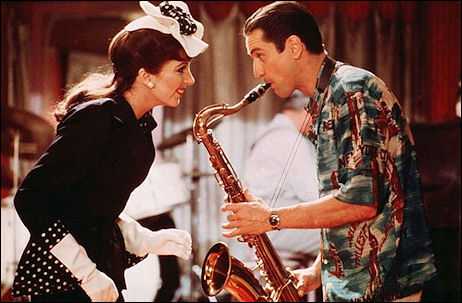HE reader Bobby Rivers has pointed out that during last night’s Martin Scorsese montage before he accepted his Golden Globe life achievement award there was no clip from New York, New York, even though the band played the film’s Kander & Ebb title tune as Scorsese walked to the stage.

Liza Minelli, Robert De Niro in Martin Scorsese’s New York, New York.
The reason, of course, is that very few people feel much affection for New York, New York. I’ve never really liked it myself. (It has one electric scene — i.e., when Robert De Niro is physically thrown out of a club that Liza Minelli is performing in, and he kicks out several light bulbs adorning the entrance way as he’s manhandled out by the manager and a bouncer). But I know I’ve always liked Pauline Kael‘s line about New York, New York (one of the most infamous cocaine movies of all time) being “an honest failure.”
What other films can be described this way? Is dishonesty a reason why most films fail? Do audience sense some kind of lying going on and therefore reject them out of hand? Honest Failures is just one way of putting it. Respectable Failures, Honorable Failures, Commendable Failures…movie history books are full of them.
I’m not defining Honest Failures as films which have steadily risen in esteem in the years since their initial release (like Charles Laughton‘s Night of the Hunter, say), but as admirable, well-made films that are still a little under-regarded, and in some instances have almost been forgotten.
